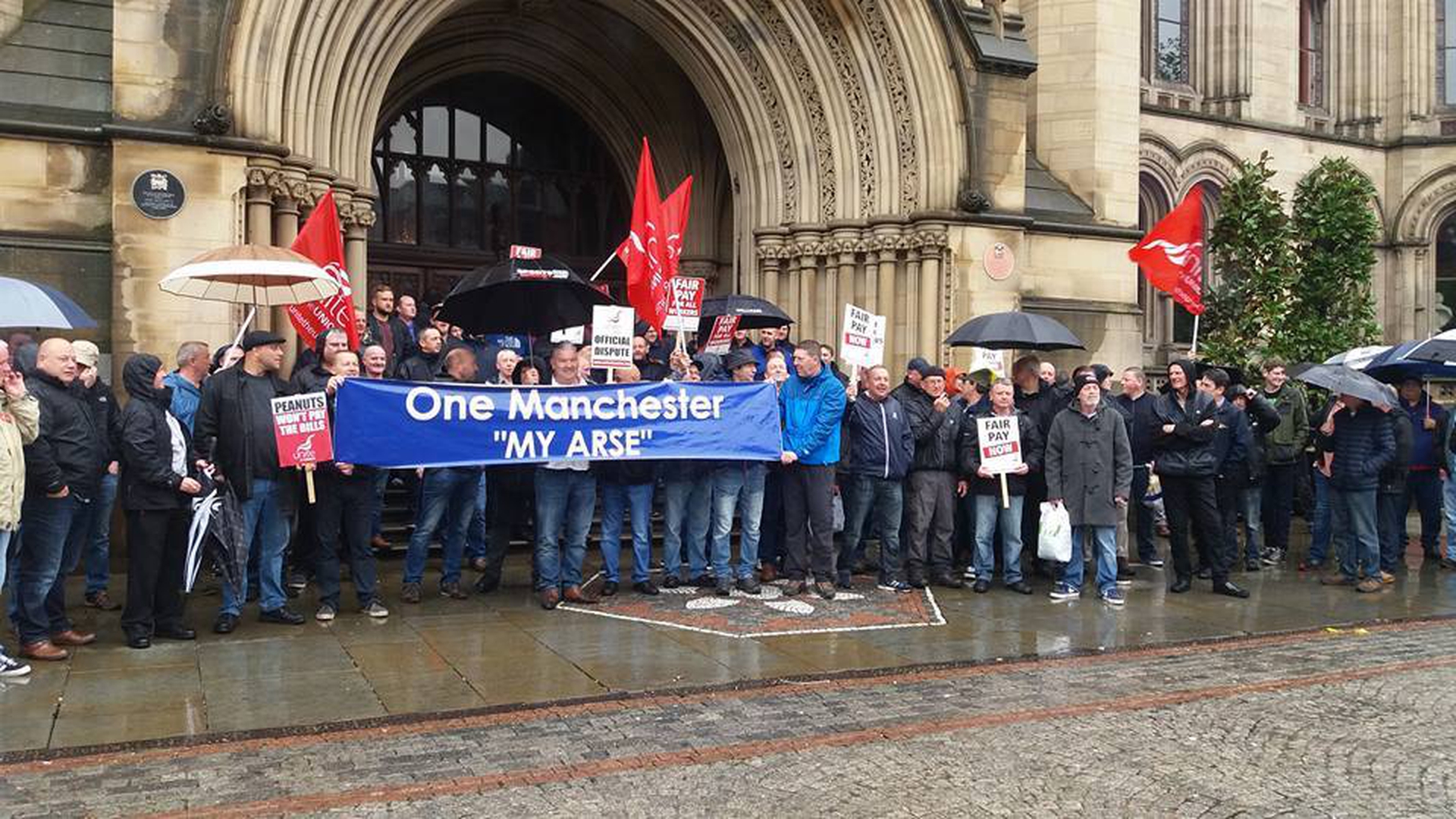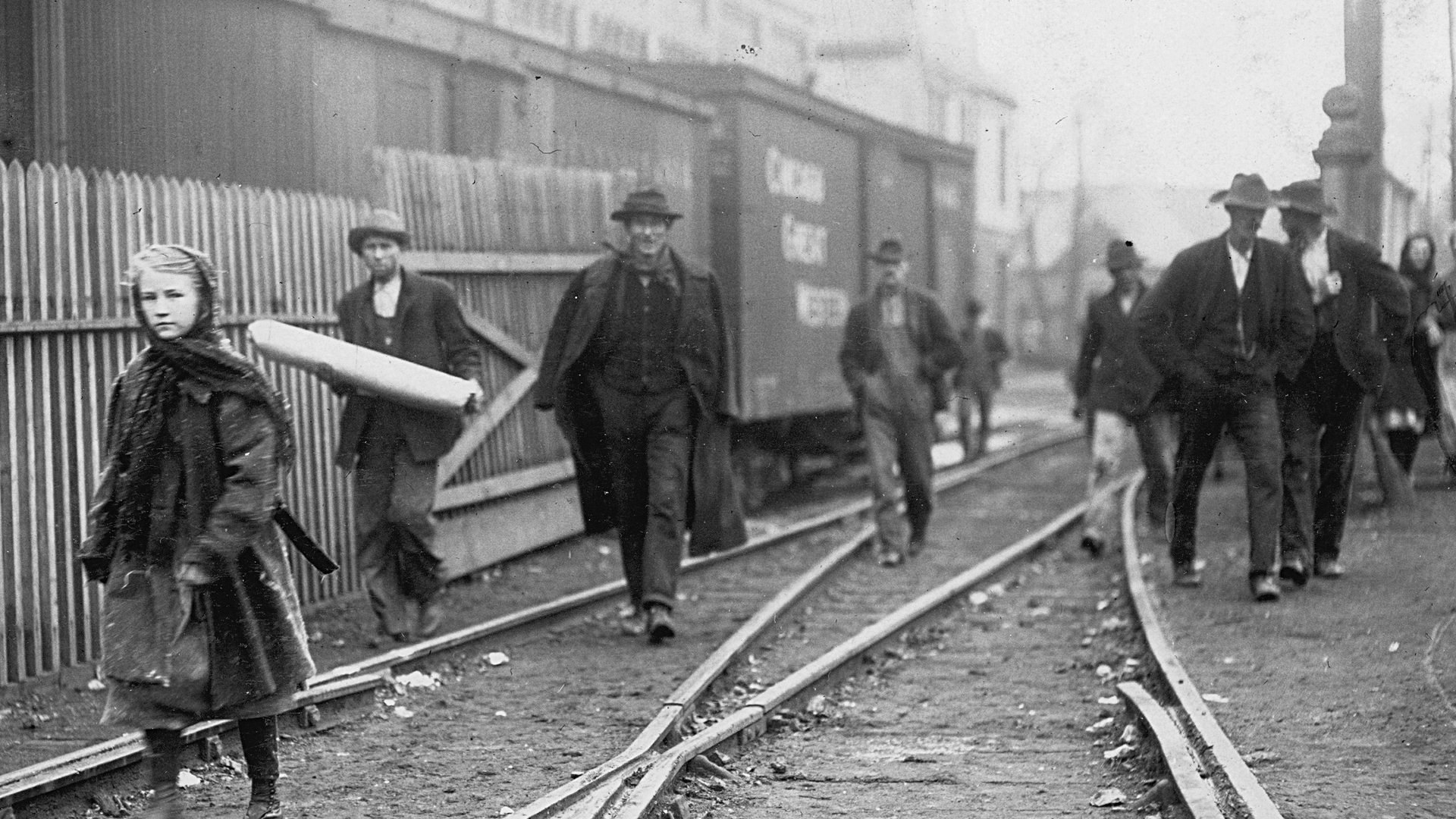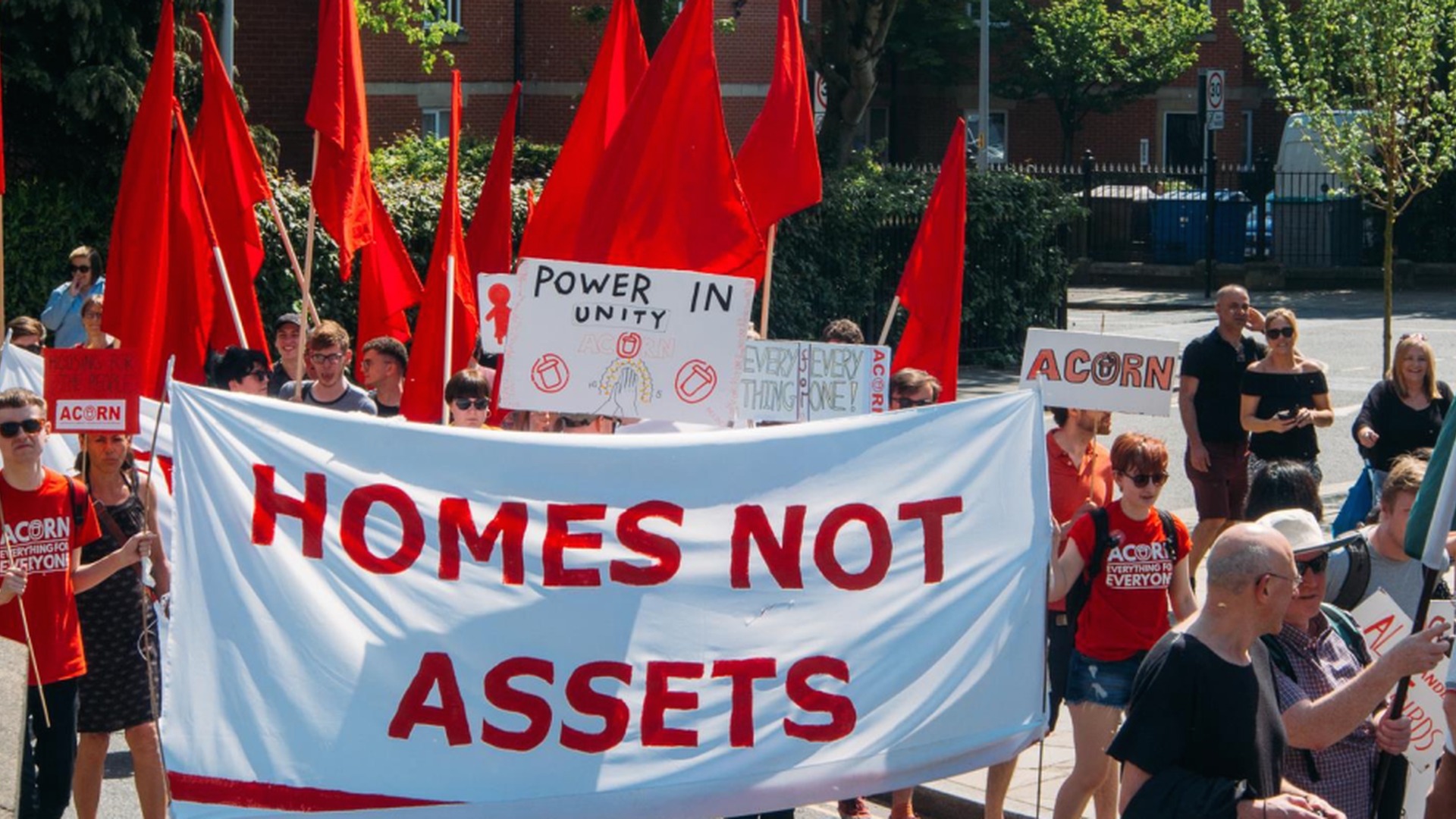Housing Maintenance Workers: Organising to Win
by
Imogen Woods,
Ian Allinson,
Bill Nugent
August 16, 2018
Featured in The Worker and The Union (#3)
An interview with Bill Nugent by Ian Allinson and Imogen Woods

inquiry
Housing Maintenance Workers: Organising to Win
An interview with Bill Nugent by Ian Allinson and Imogen Woods
In February 2018 workers employed by Mears and Manchester Working Ltd claimed victory with a 20% pay rise to be implemented in three steps over two years. The dispute that led to this victory lasted for over a year, with 87 days of strike action. We sat down with the senior steward during the strike, Billy Nugent, to discuss the strike. Billy has been a rep for UCATT and then Unite since 2013. He works as a Senior Liaison Officer for Manchester Working Limited and is now the workplace health and safety rep. The workers did the maintenance for the ‘arms-length management’1 housing organization Northwards.
Ian Allinson and Imogen Williams
Billy Nugent
What trades worked for Mears and Manchester Working Limited?
Bricklayers, roofers, joiners, heating engineers, water maintenance, all the other trades you would expect. Some other work has been subcontracted out. I’m a Liaison Officer, which is mainly dealing with the tenants, solving problems with the site managers or the sub-contractors. I’m good at thinking on my feet. I like dealing with pains in the arse and getting them on my side.
How was the work allocated to the workers?
You don’t see each other much because you’re on different sites. Because all the jobs are assigned by PDA’s which are like phones, on the plus side the operatives don’t have to go to the office much. It meant it was difficult to tie everyone up. But we overcame it with good old fashioned elbow grease, we had to go and talk to every single person and get the ringleaders on board.
So the roots of the dispute were in the outsourcing of Manchester City Council’s housing and its maintenance, could you explain how?
In 2006 the council wanted things done privately. As well as handing over council housing in the north of the city to Northwards, they created a joint venture company called Manchester Working Limited which was made up of three parties, Manchester City Council, Northwards Housing and whichever company could do the tender, which initially was Morrison. There was a lot of restructuring and redundancies when it changed to a private company so it was less about quality and more about profit. Some of our operatives went off to other housing associations, Eastlands, City South, and Willow Park. They went on new contracts and conditions with fairer terms and conditions. When we left the council we were on a bonus scheme, the union told us that they’d negotiate the salary but for the time being we’ll freeze your pay which meant people being on very different rates depending on their bonus at the time. But that never changed, the union negotiated it but ten years later we were still on the same terms and conditions.
In 2012 subsequent to problems the Morrison contract was bought out by Mears, turned out all the profits had been sent off to Scotland, so again we saw more redundancies and restructuring. Ten years ago there were about 500 operatives, now due to redundancies and restructuring, we have approximately 215. They’re not replacing them.
We have 182 members in the union. Some of them were out on strike and won’t see the benefit of it because they’re older or retiring, but they did it on principle. We’ve told the union that if any scabs want to join, we’re not representing them.
What was the dispute about and how long did it go on for?
The pay disparities. Nationally and locally we were the lowest paid housing workers and operatives in the same workplace had four, five, six grand difference in pay. I used to say it’s ridiculous, you would have two joiners carrying a plank and the joiner on the front is on 22 grand, while the joiner at the back is on 18 grand doing the same job. But it became personal and people felt insulted. The management style had become more aggressive. We went out for 12 weeks May to July 2017. During our first wave of action we had to go back to work due to an admin error by Unite, they said go back or you’ll get sacked because of the trade union bill. That was the election week and every unite official you couldn’t get hold of because they were out canvassing. I wouldn’t have minded if someone had been honest and told me that’s the way. Members felt the union had tried to hoodwink us. We then had to re-ballot because of trade union law and we went out for another 12 weeks. It was 87 strike days altogether. We made it clear to the members they weren’t off work, that pay is for doing pickets, demos and leaflet drops.
What did you win?
They gave us everything that we wanted, I thought we would lose some annual leave, but we got a 20% pay rise over the next couple of years. Everyone’s on 37 hours, some people have got a couple of hours up and some have come down. They tried to not give me and the other Liaison Officers the pay rise but people stuck together. Members insisted that the Liaison Officers who had struck got pay rises and we gave management a list. I was amazed when management gave me and the other Liaison Officers who were strikers a new grade as senior liaison officers and gave the scabs nothing. We were still a couple of grand short of what we asked for and I think I know why.
How did you start organizing?
They started making redundancies and just started carting people off in a taxi, with a bouncer at the door just in case anyone kicked off. I put in an individual grievance and ended up in a meeting accompanied by the national President of the union, UCATT [which merged into Unite in January 2017], who was our convenor at the time and all the liaison officers were told their positions were now safe. I was being told to watch my back and some workers were being told not to speak to me. Management started calling people in and asking them what they were talking to me about, but management underestimated their intelligence and they told them we were just talking about football. I still wasn’t involved in the union at that point. It was a sudden bang. Like everyone else I was thinking we’re treated terribly and someone should do something about it. There was one day I was looking out the window and thought, I’ll try to sort this mess out. That was in 2013, it took ten months for the union to let me be a rep.
I organized the first mass meeting and I was a bit nervous. Booking the venue, getting the biscuits and that, not speaking, I was alright at that. I got one of the lads to speak, because his daughter was seriously ill. So he was off a lot and wasn’t earning much [bonus when it got frozen]. I asked him to explain to everyone why he ended up like that. When you heard it, it broke your heart. That point was significant, it was building solidarity and pulling everyone together. I also noticed the attacks on younger members of the workforce, no one likes a young person being bullied, that pulled people together.
You said the strike fund was a very important issue, what did you get from Unite?
We knew that these members were underpaid for so long, I felt this was something Unite didn’t understand. The people at the union were on big money, it’s like me saying I understand what it’s like to be run over by a car, no I don’t. I have to be run over by a car to understand what it’s like. Most of the workers were living in debt. The amount of money they had to make was enough to not make them homeless. The standard unite strike pay is £35 per day, they told us we were getting double and that helped a lot with the members, because I didn’t want to make anyone homeless, you had to think about their wives and kids. One day, we had a fantastic day protesting at a housing conference at GMEX. It was raining heavily but it does bring something out of people, we had leaflets that were sopping wet. That’s when we had the poster of our managing director and the managing director of Northwards saying wanted for crimes against the working class. So it was a fabulous day and I went for a meeting at the union office with some union officials to persuade them about the £70 because struggling people are living in debt. We got it confirmed and we went down the pub. A lot of memories made, even if you lose there will be memories there for the rest of your life. I said to the members when we win this, it won’t be the money it will be the memories you made and the friends you’ve got. But the scabs, it will be the opposite, it will be the friends they’ve lost. There’s a lot in it all, it’s intricate.
You’ve spoken before about ringleaders, what do you mean by that?
There are a lot of people that are influential to others for whatever reason, maybe they’re more confident or articulate and workers elevate certain people. We had these individuals and the technique I used to get them on board was to get them to help. Everyone loves to feel they’ve helped someone. A lot of people were angry. Sometimes one would ring me up raging about something, rightly in my opinion. I’d go and visit them and try to get them involved. They were angry, but you just have to guide that energy. All these individuals I had to tie together, so when I organized the pickets I paired the people that I needed to get on. Then I needed to join them all up, which is when the pub comes into play… and the leverage committee, which were the ringleaders. The ability that was sat round King Arthur’s table! They were just treated like shit by the company. So I got the ‘ringleaders’ on the committee, there were nine of them.
Did you receive any threats from management?
My third grievance was when I was a rep and I was going to meetings, they started accusing me of not working to my times so they tried to dock my pay. But they underestimated me going through the paperwork, I went through it and showed them I’d done my hours, appealed it, within a couple of days they came back saying ok, you get paid. Some of the threats worked in our favour, because they were bullying younger members. That convinced people on the fence about the strike, they said never mind the money, I’m hitting the gates. We went into negotiations and the boss would smirk at us, I was with a lad that had never been to one of these management meetings before and he couldn’t believe the childish behaviour of management.
How did you get younger members on board that might not have even heard of a union before?
Because I’m approachable, younger people talk to me. We recruited the younger people by protecting them from management bullying. I planted the seed with them and then walked away and let them come to me. They don’t have the fire of my generation, the punk generation, but sometimes you’ve got to grow a set of bollocks. I feel like a lot of the younger generation haven’t been given information. They now come find me because they’ve seen a victory, they’ve seen winning and you can’t beat that.
We have a lot of what you call improvers. When you finish your apprenticeship, you’re not ready to go out on site all singing and dancing, you have to serve your time, proving yourself. You do the apprenticeship and then you become an improver, so you’re not a fully qualified tradesman. That should last no more than six months, and this company put them on that grade for two or three years doing a tradesman’s job and still on apprentice pay. From our point of view it’s slave labour. Bottom line is put them on the money.
What was your relationship with the council?
Me and another rep thought we had to fight them openly, but another of the reps tried to keep a good relationship with the council. But in the end he said that they made lots of promises and told lots of lies, to cover the fact that all along they knew we were the lowest paid workforce in Manchester and they were happy to keep the cost down and the profits high at the expense of the workers.
How did UCATT and Unite work together before the unions merged in 2017?
That was our Achilles heel, the president of UCATT worked with us and hated Unite. And there was an agreement, there was a point when the company said they’ll put everyone on 22, 23 grand round there. What it meant was some coming down for people to come up. Those losing out were mainly Unite, so they voted against. He wouldn’t talk to Unite after that. We were victims of the trade unions not getting on, we lost a lot of the communication links between the unions. To be fair to him, because he’s not here to defend himself, he was thinking about bigger things. But we lost a lot of the communication and one of our reps said that to the UCATT president.
How did workers and union members communicate considering you were a workforce that weren’t in one central location?
Two of the ringleaders and reps set up a Facebook group that the workers organized with to pull people together, it was especially useful when we knew we had a spy on it, so we put things on there that we wanted management to see. They’re idiots I tell you. When I first started going to management meetings I was disappointed, I’ve had more in depth intellectual conversations with the labourers than these directors. A lot of our workforce didn’t like social media because they’re older, so you combine social media and the in person communication. We also got a newsletter going which was a big part, because I asked the ringleaders what they wanted in it.
You mentioned a lot of people left the company after the dispute, which is pretty unusual considering the rise in pay and the victory, why do you think that is?
Because it was about the principle, and the relationship between the workforce and management is toxic. My conclusion is your dealing with people not that intelligent, they had a childish knee jerk reaction. My opinion is focus on the bullying and the other issues will resolve themselves. I heard something on the grapevine and Northwards have sacked a load of people for bullying, but bully number one was at the directors’ meeting the other day. What do you read into that?
What advice would you have to workers that want to organize?
In no particular order, strike pay is fundamental especially if your members are in debt like mine were. Solidarity in the workplace, build a bond with everyone and get them to trust each other, once you get to that point you can’t go back. The communication thing is very important, which I’ve said about five times, that means regular updates and sharing information. The leverage committee of ringleaders which was the King Arthur’s round table. Don’t underestimate people, some of the most genius ideas come from the people you least expect. Pickets, demos, leaflets, campaigning, you got to do all that. Be honest. And you got to show aggression when you’re speaking. We did pickets, protests, we met with councillors, we door knocked tenants, we got everyone together for socials and organizing meetings. It has to be tight and you can lose it very quickly. It all came down to communication and organization.
-
An arms length management company is a company that manages council owned housing stock. ↩
Featured in The Worker and The Union (#3)
Subscribe to Notes from Below
Subscribe now to Notes from Below, and get our print issues sent to your front door three times a year. For every subscriber, we’re also able to print a load of free copies to hand out in workplaces, neighbourhoods, prisons and picket lines. Can you subscribe now and support us in spreading Marxist ideas in the workplace?
Read next


